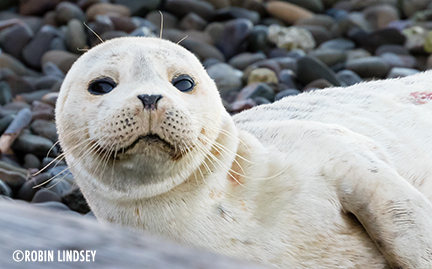Seal pup rescued by stranding team is stable at rehab facility
Jan/13/17 05:44 PM

The curious pup, estimated 4-6 months old, watched as Lynn closed off the area, stretching yellow tape between orange cones and sandwich boards, around a picnic table and a prickly “sticker” bush, since the ground was too frozen to pound in stakes. Reluctantly removing her glove in the frigid 24 degree air, she speed dialed the Volunteer Scheduler for the day, Jonel, who began lining up Seal Sitters for what could potentially be another long day on the beach. On Wednesday, this same pup nicknamed Hope, did not return to the water until around 5pm, well after dark.
While John and Lynn kept Hope safe from disturbance, First Responder Robin began the process of lining up a health assessment by a NOAA-authorized consulting veterinarian, a recently implemented program to assist stranding networks with on-the-beach evaluations. Handling and transporting an animal for evaluation causes undue stress, which has its own negative impacts. Examinations are only done when there is sufficient cause or concern.
The day before, volunteers noticed the pup had a number of pale bloody spots on her white coat - perhaps Hope had a serious case flipper lice and had been scratching the areas raw. However, in closer review of photos on a computer that evening, things looked suspicious. There was a possibility these were punctures, though difficult to tell in the roughened fur. The only way to know for sure would be a closer examination and we were lucky that the pup had indeed returned for another day of rest.
After consulting with regional coordinator for NOAA’s Marine Mammal Stranding Network, Kristin Wilkinson, a call was placed to PAWS Wildlife Center to ensure the facility could accept the pup for treatment if necessary. The next call was placed to Dr. Lesanna Lahner, consulting vet and Executive Director of the newly-formed SR3, a non-profit dedicated to marine mammal health.
Early in the afternoon, the team of Seal Sitters responders and SR3’s Dr. Lahner and Casey Mclean discussed the next steps, while observing the sleeping pup. As the team approached, the now awake and feisty pup was captured with a net and examined on the beach. Blood oozed from what was definitely many puncture wounds. It was obvious Hope needed to get treatment. Seal Sitters volunteer Bob offered to make the long drive north and transport Hope to PAWS in Lynnwood. Upon arrival, rehabbers stabilized the pup and cleaned out her wounds.
We were stunned to learn that Hope, a female weighing about 34 lbs, had more than 20 puncture wounds on her small body, believed to be from an unidentified animal(s) - possibly canine, but unable to say with any certainty at this time. Thankfully, the bites were not deep and not yet abscessed.
Hope survived the night, but PAWS staff is cautious about her survival, as there are some bleeding issues not really explained by the superficial wounds. The reason for the bleeding continues to be investigated. She has been given a little pool to help keep her hydrated and active and the wounds moist. Hope is also receiving treatment for parasites, common for all weaned seal pups during winter months, which contributed to her occasional coughing spells on the beach and often leads to serious viral conditions.
Seal Sitters will keep you posted about Hope’s condition and any new information that comes to light regarding the cause of the puncture wounds. Thanks to all of the volunteers who protected the little pup during her stay on the beach and to supporting members of NOAA West Coast MMSN who assisted in her rescue. Heartfelt thanks to PAWS for their kind and expert care of wildlife. We hope for this pup’s recovery and release back to the waters of Puget Sound.
PUPDATE 1/19/17
PAWS Wildlife Rehabilitation Manager, Emily Meredith, reports that seal pup Hope is feisty and doing “pretty well.” She’s eating fish on her own in an outdoor pool and has begun treatment for lungworms. The treatment itself poses health risks for animals and rehabbers remain cautiously optimistic about her recovery.







